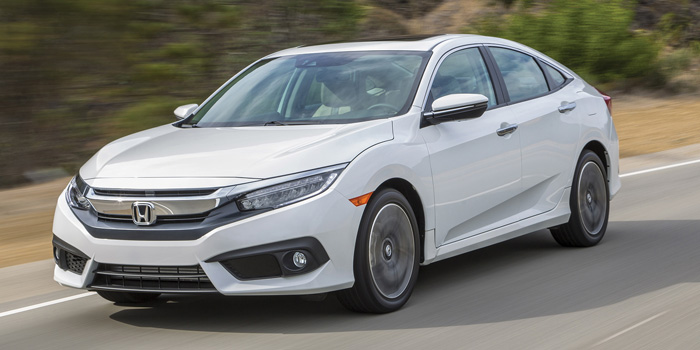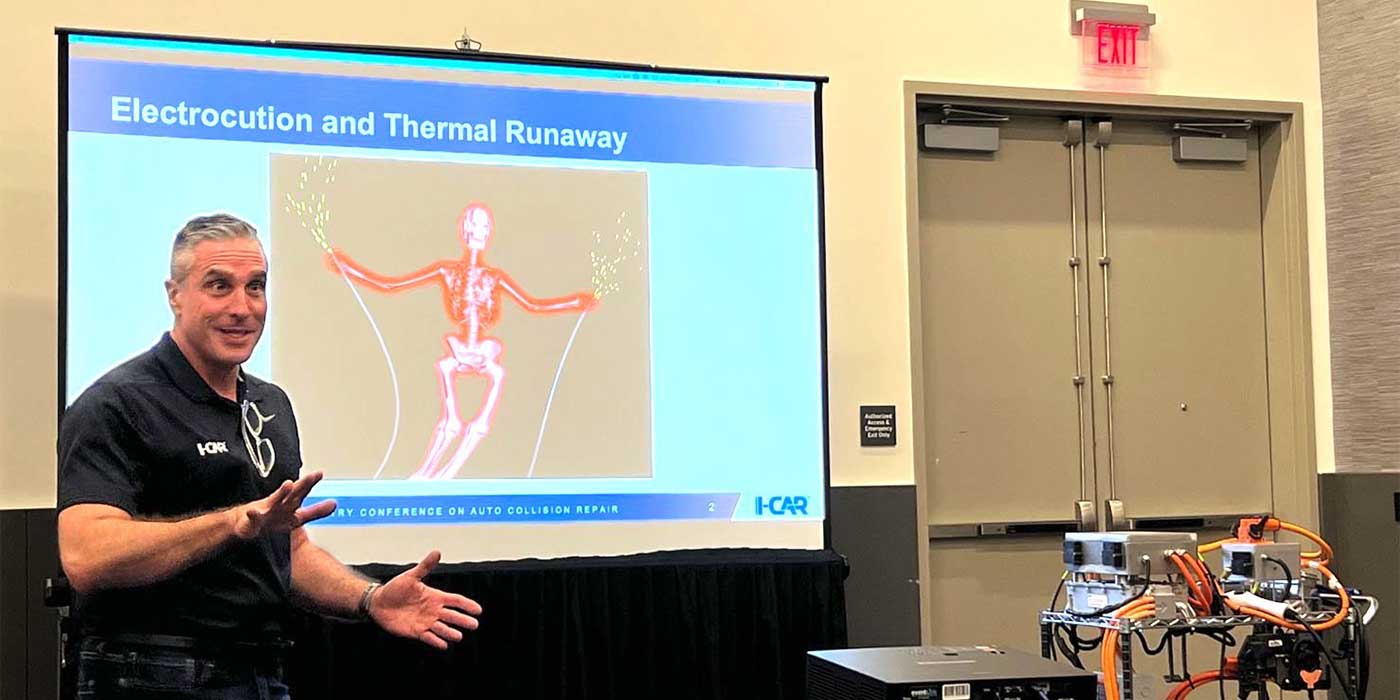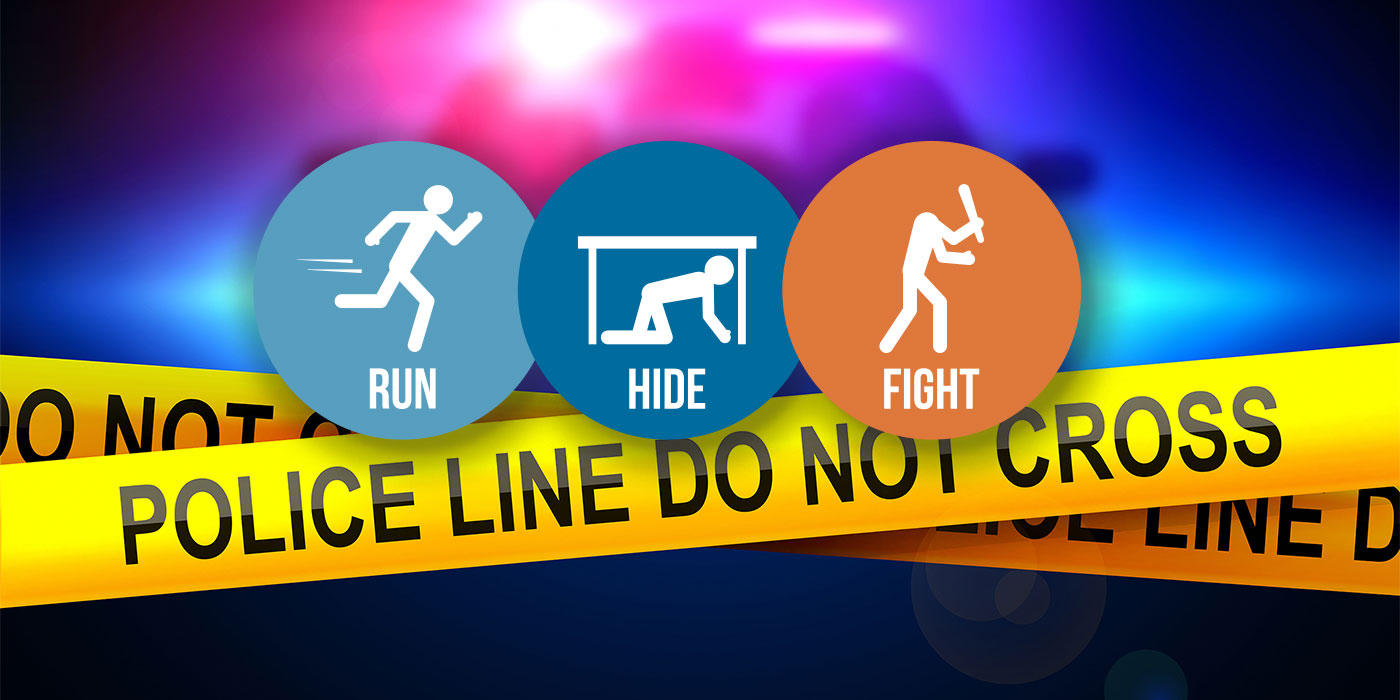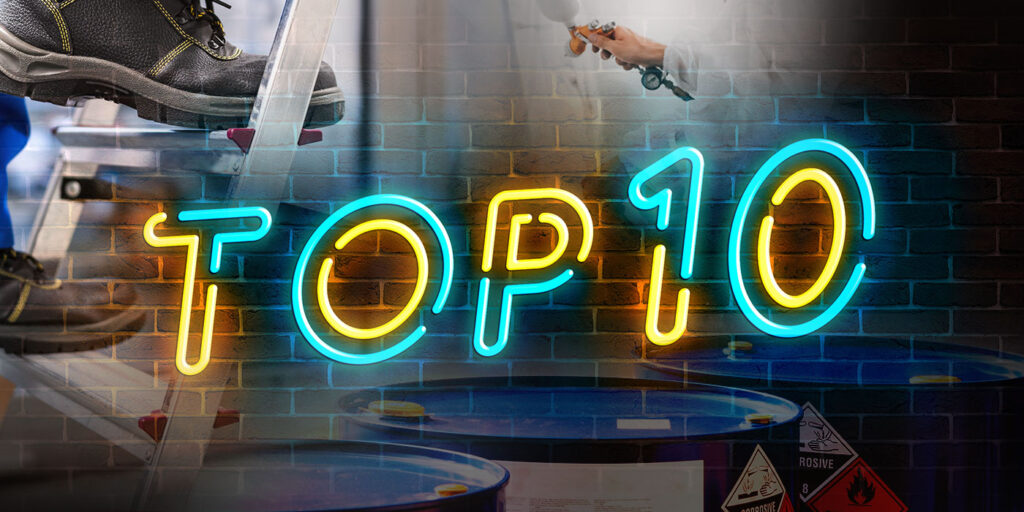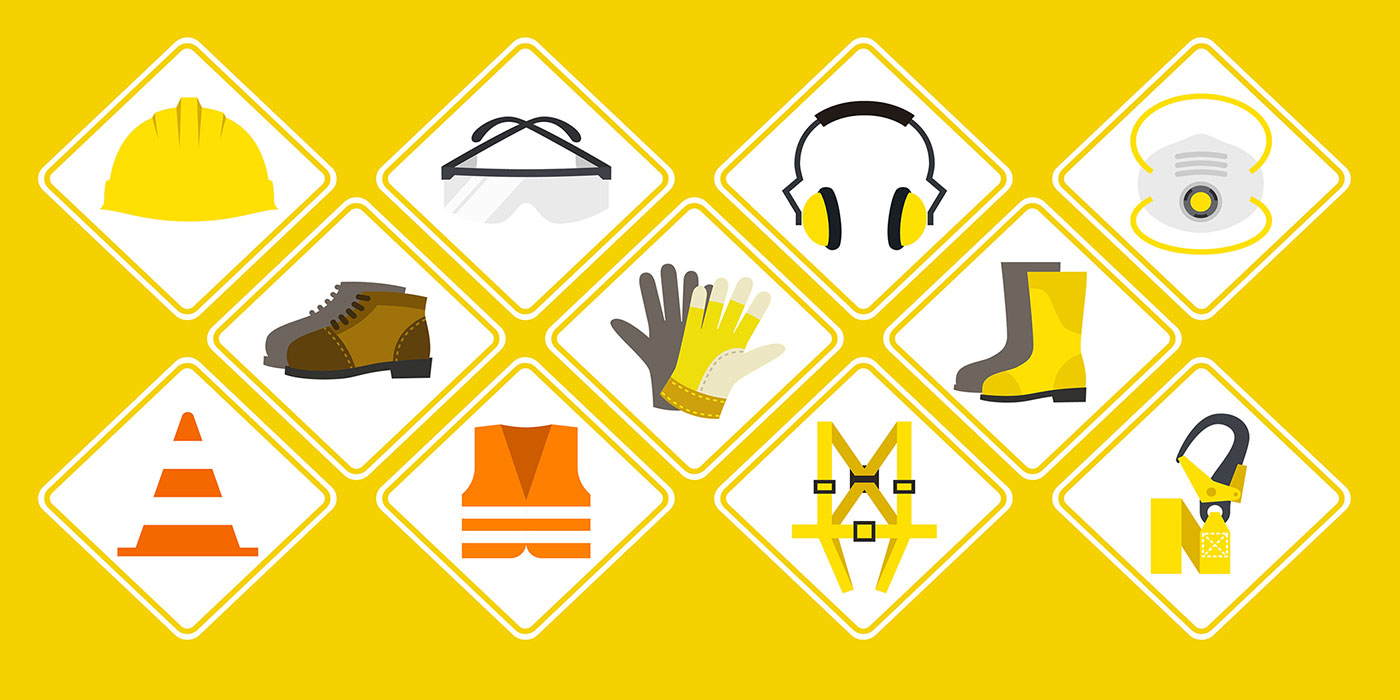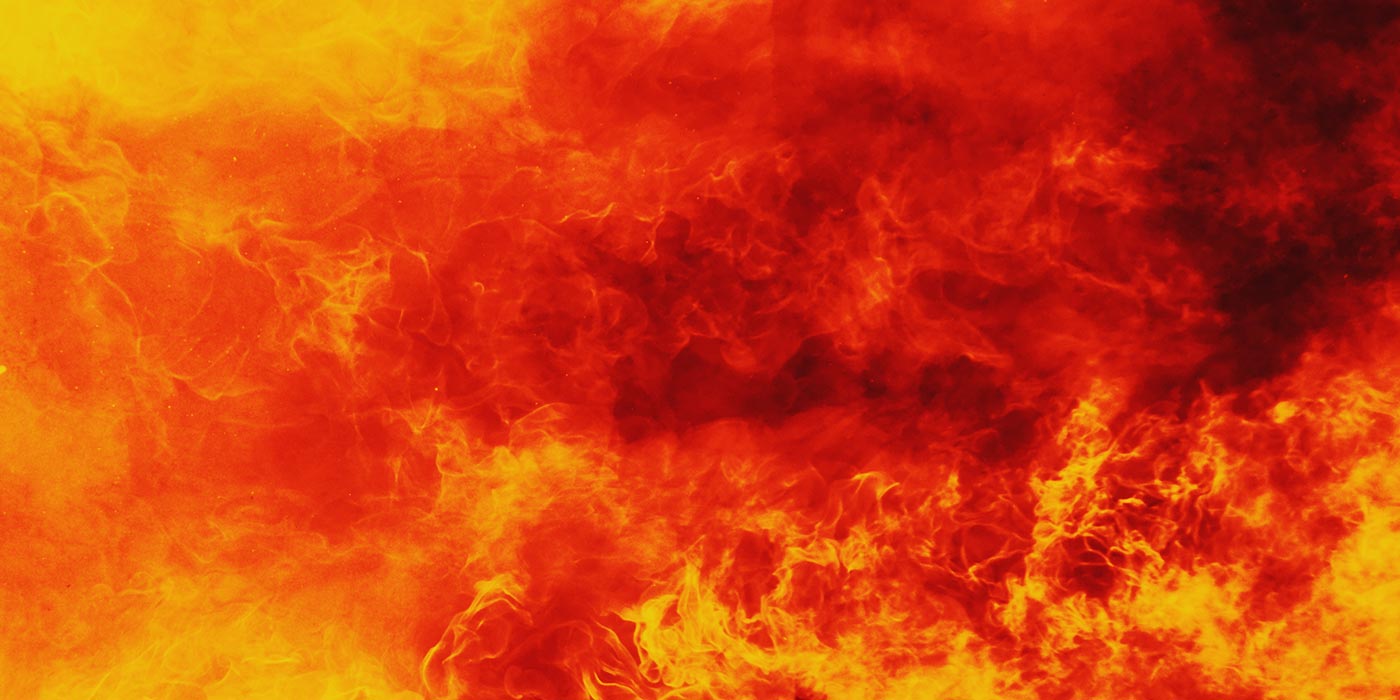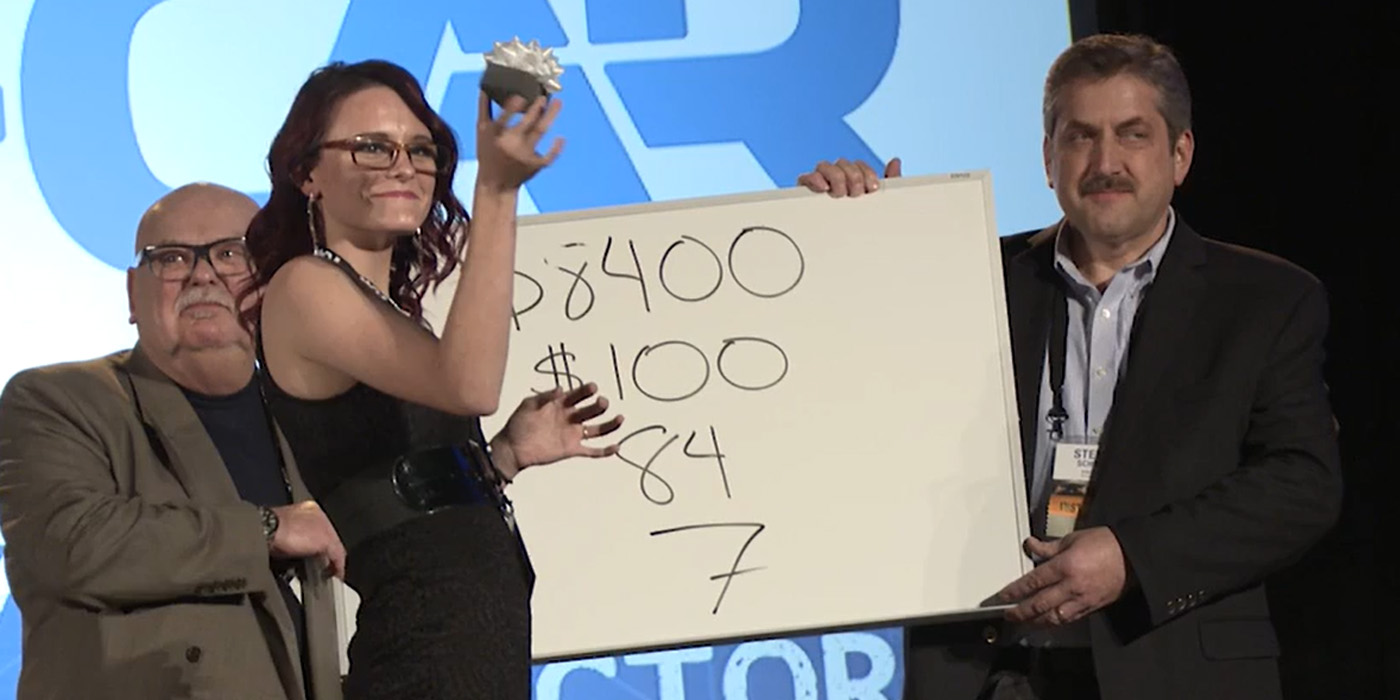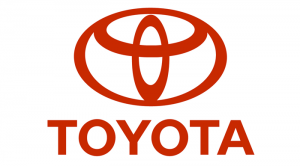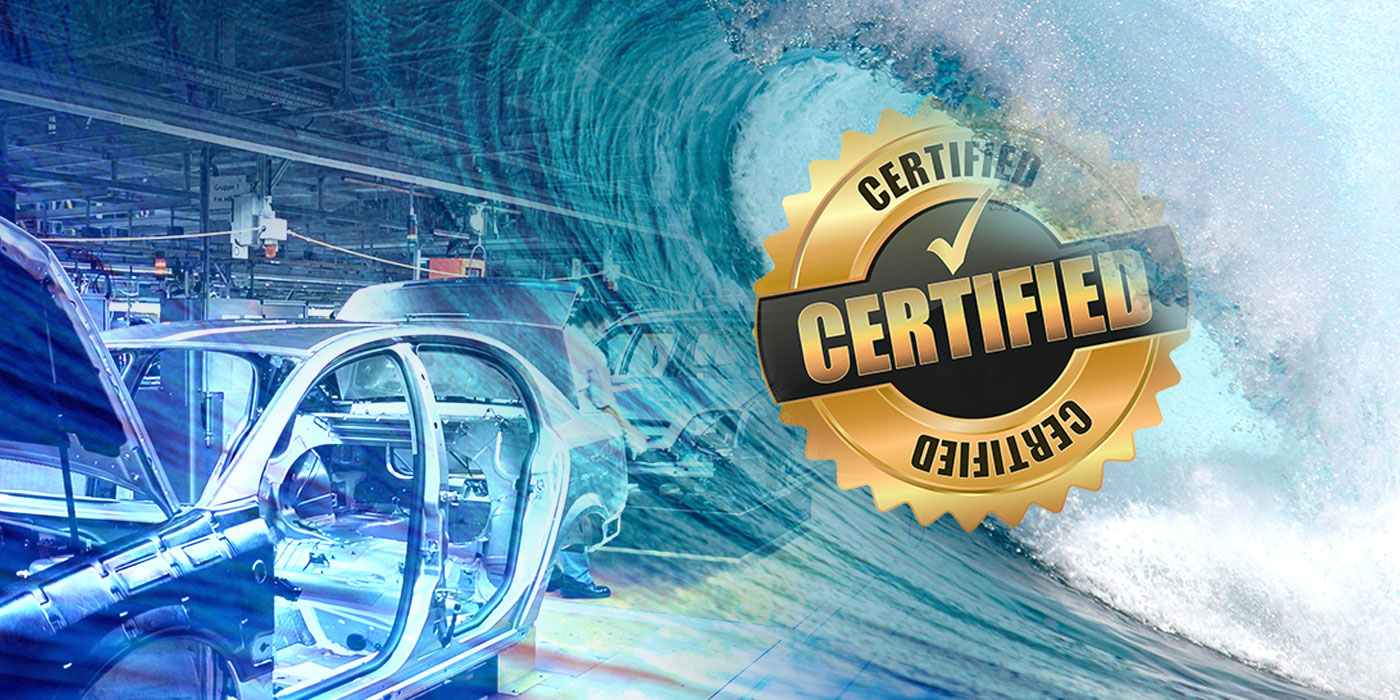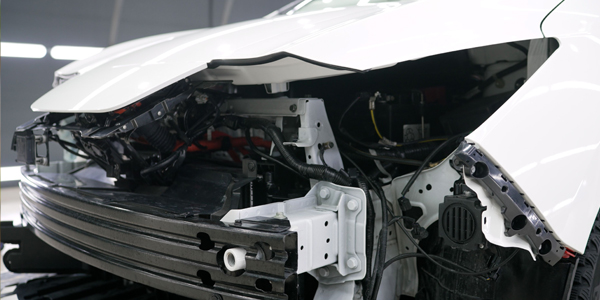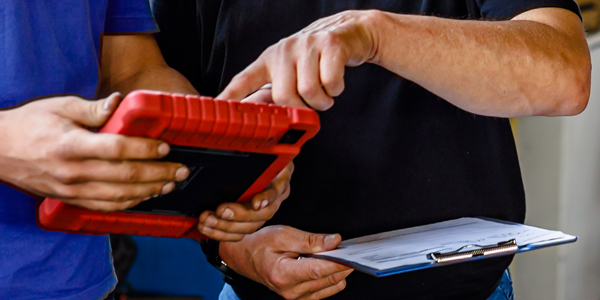As vehicles get more and more sophisticated, the volume on talk of OE certification goes up. With all of the exotic substrates and sophisticated technology going into cars today, body shops that aren’t OE certified and don’t have the proper tooling and equipment and access to OE repair procedures are increasingly setting themselves up for potentially litigious situations.
“Shops have to remember that they ultimately have all the liability associated with the repair,” says Bill Fowler, a former shop owner whose retirement was precipitated by the emergence of this new technology and the investment required to competently repair the “computers on wheels” we have today. “An example is the big debate about pre- and post-repair scanning. A shop contacts the insurance company and says the manufacturer says this has to be done, and the insurer says, ‘That’s not usual and customary,’ ‘You’re the only one,’ and the other various excuses they use to avoid paying. That does not absolve the shop of the responsibility to do the pre- and post-repair scan. So the shop either has to pay for it themselves or approach the customer or leave it undone, and in too many instances, they will leave it undone. If the person in that car has a subsequent accident and the airbag doesn’t deploy as it should, the lawyer will come after the shop. What sort of defense is it for the shop to say, ‘Well, I approached the insurance company but they said they wouldn’t pay it.’ Does the shop actually believe the insurer will back that up? They will sit on the side of all the accusers pointing the finger at that shop saying, ‘Well, he’s the collision repair expert, he should have been more insistent.”
Being a former body shop owner, Fowler says he is every shop’s worst nightmare because of the knowledge he attained over the course of his 30-plus year career.
“Let’s presume I have an accident. When the repair is completed and I get my car back, the first question I will ask is, ‘Did you repair it per the manufacturer’s protocol?’ I happen to have knowledge to know whether they’re lying or not. If the car has not been repaired per the manufacturer’s protocol, it has nothing to do with the insurer. The insurer has no liability, so the shop has no choice but to repair the car according to manufacturer protocol or be prepared to start buying cars back.”
According to Fowler, Mississippi is trying to push for legislation that would prohibit a non-certified shop from writing an estimate for and/or repairing a car that requires certification.
“What we have faced traditionally are repair standards and an approach that has been predicated on cost mitigation more so than the comprehensiveness of the repair, so it goes without saying that the guy who has invested nothing is more prepared to work on a car at a cheaper price because he doesn’t have the investment,” Fowler says.
Certification Believer
Bill Hawkins, certified collision repair center (CCRC) manager at BMW/MINI of Annapolis (Group 1 Automotive), is a big believer in certification. He has been part of the BMW certified network for 15 years, since the original shop he worked at, Weatherford BMW in Berkeley, Calif., was one of the original BMW CCRCs.
“I’ve been working on BMWs almost exclusively most of my career, and the thought of shops that don’t have the right training and equipment repairing our cars, as a consumer, is a little frightening,” says Hawkins. “Some of the things I’ve seen with cars repaired at other shops that come in here is pretty scary stuff.”
Hawkins feels certification is where the industry is heading, but feels it’s still regional as he has worked at shops on both the West Coast and East Coast and says they’re two completely different worlds.
“California has some pretty big consumer protection devices in place. The DOI is relatively strong and, between them and the BAR, you have a lot of checks and balances and the consumer to me seems to have a lot more say-so as to what happens to their car out there. I don’t know if it’s because it’s more of a car culture there or that the insurers aren’t as strong. But now that I’ve been in Annapolis for four years, it’s shocking how regional it is in terms of how certification is looked at both by consumers and insurers.”
Hawkins feels he has a distinct advantage being a part of a Fortune 500 company in that he can afford the high costs of being BMW certified, including the $40,000 worth of equipment and tooling he has to buy before the end of 2016 to maintain his certification.
“We can obviously afford those kind of cash outlays for that, but if you’re a small independent, that can be difficult,” Hawkins says.
An Economical Way
But there is a more economical way for small independents. For example, through a program at Assured Performance Network, a shop, for an annual fee of $2,950, can get certified for Ford, Nissan, Infiniti, FCA, Hyundai and three or four other automakers to be announced in the next couple of months.
“There is nothing we require in these certification programs that a shop shouldn’t have,” said Assured Performance Network CEO Scott Biggs. “These aren’t luxury items. And our requirements are the minimum of what the shop should have to properly and safely repair the vehicle. It doesn’t mean what the shop might have way in excess and in addition. This is just the minimum.
“Our programs are all driven by OE specs on what it takes to properly and safely repair the vehicle. These are bona fide requirements. And these are things the shop should have regardless.”
And there are lots of value-adds from Assured Performance that shops get for their annual fee, namely online shop locators and apps that are both consumer- and insurer-facing.
Shops continually express concerns over the investment required to be certified and when they’ll get a return on that investment (ROI). But Biggs doesn’t understand that.
“If you’re talking about certification for the mass market top-tier car manufacturers, there is absolutely nothing to be scared about. Will it require you to invest? Yes, but you have to invest in the tools and equipment any way if you’re going to repair the car properly.
“And ROI for what? For having the tools and equipment you need? Let’s just say there was no such thing as certification. What’s the return on investment that a shop has for having the right tools, equipment, training and facility? It’s the ability to continue to repair those cars. Why should any shop touch a car if they don’t have the right tools, equipment, training and facility? This isn’t a DRP or dairy cow approach where you stand around and say, ‘OK, milk me.’ This is something where you have to run a proper business.”
DRP vs. Certification
Hawkins can’t imagine being a small independent that is completely DRP driven in today’s environment.
“There’s such a disconnect right now between how the insurers look at it and how the OEMs look at it, the way the car should be repaired versus what the market will do,” he says.
Getting certified is half the battle, but the other half is marketing that you’re certified, which most shops don’t do a good enough job of.
“Marketing is critical,” says Hawkins. “We have 60 to 75 of our customers come into our service department every day, and it’s our job to market to them. I was surprised when I got here in Annapolis how few customers knew we had a certified body shop. I’ve been working to fix that because it’s important. You have to do your legwork. What are people saying on Yelp and Google?”
Shops’ distaste for marketing is why DRPs have taken over the industry, Hawkins says. “No one wants to do their own work; they just want to open their door and watch cars flood in.”
Certification has been far from a guarantee that Hawkins’ shop will get the lion’s share of work in his market. Neither has being a dealer shop, which one would think would give the shop an advantage with consumers who feel they need to take their vehicles back to the dealer for service and repair. Fighting DRPs and steering is still a daily battle. Hawkins sees independent shops around him that have GEICO Xpress, Allstate DRPs and State Farm Select Service with lots that are overflowing with cars.
“Getting over the hurdle of steering is tough,” he says. “Obviously, BMW with Connect and Assist is trying to mitigate some of that, but there’s only so much you’re going to be able to do. And every BMW I’ve repaired doesn’t have the newest, most state-of-the-art technology in that they’re still five to 10 years old.”
Hawkins is honest with customers in telling them that his shop is not the only one that knows how to fix a car. But he also knows the car of today is not the car of 20 to 25 years ago and it’s never going to be.
“There will always be a place for a good frame guy, but when it comes to other things like pre-scanning to figure out why that SRS light is on the dash because there is no airbag deployed, being able to have access to the technology and info to be able to pre-scan that car and know it’s the pretensioner or deployed or partially deployed, there is value to that as well. So I don’t look at it as an either/or proposition in every case.”
Specialization
Certification and specialization has worked out quite well for Kye Yeung, president of European Motor Car Works in Santa Ana, Calif. His shop is a factory-approved Aston Martin and Jaguar Authorized Aluminum Repair Center for “A” structural and “B” non-structural repairs. It’s also an approved center for Land Rover, Lotus, Tesla, Rolls-Royce Ghost and Corvette.
“The basic thing I feel that allowed us to be successful is aligning ourself with certain OEs and cross training my employees in those specific cars and catering to those specific cars and making us more specialized and experienced in giving a quality repair,” says Yeung. “If you’re doing the same type of vehicle every day, you can only improve. It allows you to stock parts, clips and fasteners for that brand. In the perfect world we’re in, we do only four specific brands only. Things become a process – the color matching, frame racks that are pre-set up, etc. Employees can go to a toolbox for the exact wrench used on the car before. These are little things that make our bottom line better. Consumers also see cars like theirs on our lot so they have confidence we can fix them. You can go down the street and get a bunch of estimates, but you know what we specialize in.”
Certification for Survival?
Do all shops need to be certified to survive in the future? Hawkins doesn’t necessarily believe it’s a do-or-die situation just yet and can’t seeing it be that way in the next five to 10 years.
“It will just be another tool in your toolbox,” he says.
Then again, there are some cases where certification will be necessary.
“I’m going to school this year for the i8. I’ve already been to the Body Level 1 for the i3, which is just a body adjustment class. Then you get deeper into carbon fiber structural repair, and I’m telling you, independents without access to info and tooling and training are just not going to be able to fix those cars. And carbon fiber is coming. It’s the wave of the future, just like aluminum was and is.”
Fowler takes a more black-and-white view.
“If they’re going to stay in this business, they have to become certified to repair these cars,” he says.
Still, there are repairers out there who aren’t completely sold on OE certification just yet.
“I am sure it is something we will need in the future, but I have not seen a need for it yet,” says Jeff Feasel of Feasel’s Frame & Collision in Tiffin, Ohio.
Feasel’s shop is located in a rural market, and so he doesn’t see a lot of exotic brands of vehicles. Even with the aluminum Ford F-150, he has only done a couple cosmetic repairs on them.
“So, if we lose one or two of those a year, it’s still not worth the $80,000 you have to spend at this point,” Feasel says. “No one has even asked if we are certified yet.”
Feasel understands that it’s not just the expensive exotic vehicles that are sophisticated anymore, but says his shop is not going to perform any procedure or repair that will risk compromising the safety of the vehicle. “The dealer is just a phone call away.”
Will Body Shops Need to Get Certified to Survive in the Future?
“Collision repairers will need to become OE certified to thrive, not necessarily to survive. OE certification is driving the industry to greater heights and accountability to ensure a safe and proper repair. The advancements in the way cars are being manufactured are at the root of certification. There is a quote that I believe defines the impact of OE certification on the marketplace: ‘A rising tide lifts all boats.’ While that is a true statement for the industry-leading collision repairers, the level of training, equipment and tooling required to attain OE certification will drive many lower-tier collision shops out of business.” – Dan Risley, president and executive director, Automotive Service Association
“If you’re specializing in old pickup trucks or horse trailers or restorations, then no, OE certification won’t be mandatory. But for anyone doing the bulk of the new vehicle market and plans on it going forward, most definitely.” – Scott Biggs, CEO, Assured Performance Network
“”Survive’ is too harsh a term. To be profitable is a better term. The issue is with all the technology coming down the pike, if you don’t have an alliance with an OEM, there will be parts restrictions for consumer safety and assurance to the OE that cars are being repaired properly. With the future of connectivity, if you have an issue, the car will direct you to a certified repair facility and circumvent the independent shop that didn’t participate in these programs.” – Kye Yeung, president, European Motor Car Works
“I think that the industry is definitely transitioning from that of a general practitioner to one that is more specialized, and I think that there is no doubt that the automakers with new-model vehicles are moving toward more specialty and certain expectations that are make-model specific that didn’t exist in older model vehicles. So I think how that shapes up as it relates to certification is probably going to differ a little bit from one automaker to the next, and I think you’re going to see an evolution of those types of programs. But yes, I think that shops that want to fix cars the right way going forward on future makes and models are absolutely going to have to pay attention to those changes in the vehicles, the expectations of the automakers and the initial requirements they’re going to have to meet as it relates to training, equipment, facility and ability.” – Aaron Schulenburg, executive director, Society of Collision Repair Specialists

